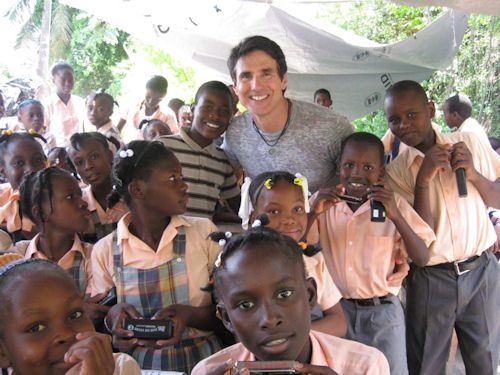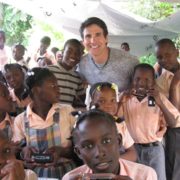HARMONIKIDS TO HAITI
 I am a professional Blues musician and the founding director of Harmonikids, a 501(c)(3) non-profit organization that provides music therapy to special needs children through shiny new harmonicas and gentle, entertaining music lessons – often in the most devastating time of their life. For 25 years Harmonikids has effectively aided thousands of children worldwide including those traumatized by natural disasters such as the tsunami in Indonesia and Hurricane Katrina in Louisiana.
I am a professional Blues musician and the founding director of Harmonikids, a 501(c)(3) non-profit organization that provides music therapy to special needs children through shiny new harmonicas and gentle, entertaining music lessons – often in the most devastating time of their life. For 25 years Harmonikids has effectively aided thousands of children worldwide including those traumatized by natural disasters such as the tsunami in Indonesia and Hurricane Katrina in Louisiana.
Naturally, when the earthquake devastated Haiti in January, I wanted to bring the same kind of unique relief to children there. The statistics are beyond staggering; millions of children were left homeless and hundreds of thousands orphaned – even prior to the quake. Shockingly, an estimated 300,000 of those children are domestic slaves (in restavek) commonly neglected, exploited, and subjected to physical, emotional and sexual abuse. It seems inconceivable that a country, particularly one born out of a fight for independence from slavery, could enslave its very future. Yet, Haiti ironically and tragically incorporates slavery into its culture.
Well aware of the degree, complexity, and scale of Haiti’s needs, I knew that Harmonikids could not “save” Haiti. Instead, I focused on what I could do, and what I do best to reach those most in need. I contacted the Restavek Foundation (an organization whose goal is to end child slavery in Haiti) to partner on the mission with the essential logistical and on-ground support. Director Joan Conn enthusiastically and generously offered her support. Next, I contacted my professional endorsers, Hohner Harmonicas, who generously donated and shipped 1000 harmonicas.
The purpose of Harmonikids mission in Haiti was simply to provide a musical sanctuary, a means of self-expression and joy to children traumatized by the recent earthquake – some remarkably distressed Haitian children. The sessions we provided there effectively provided this and more ~ they offered kids a means to access some of the childhood hopes and dreams that had been cruelly stolen from them.
OVERVIEW
We visited 7 locations in and around the most poverty-stricken and devastated areas of Port Au Prince. The sessions were held in improvised schools that the Restavek Foundation has been partnering with and supporting. The facilities were often makeshift and either outdoors, under a tarp, or in a dilapidated structure or church, some lacking windows or doors. Mosquitoes swarmed in hundred degree temperatures. The rubble from the earthquake was ever-present. Each gathering began with as many as 200 kids welcoming us by singing their favorite songs in Creole. They sang sweetly but also with great volume and exuberance. I was immediately impressed by their deep musicality. With the help of Rosalyn Phillips, my interpreter from the Restavek Foundation, I introduced myself and explained that I was there to gift them with harmonicas and teach songs to rousing excitement. I asked if they had ever seen, played or heard a harmonica before, and with very few exceptions none had. They had a nervous but inquisitive look in their eyes.
THE MAGICAL WARMUP
I always start my Harmonikds sessions by igniting kids curiosity with the magic of harmonica music. I asked if they’d like me to play some songs for them to a resounding “Èwé!” (yes in Creole).
I then asked if they had ever heard of a music called “The Blues”, to which there was always silence. I proceeded by performing a Blues song, backed by my “band” ~ a portable recording of a Blues band that I brought along on my iPod and mini speakers. Their response was that always that of curious delight. Though they had certainly never heard such music, they would tap their feet, clap their hands and snap their fingers in perfect time. I would continue with my train song, which involves playing two harmonicas energetically whistling and chugging to a speeding crescendo, and then slowly lurching to a stop. Although there are no trains in Haiti, they responded with jaw-dropping amazement and applause at the sound coming from these small instruments cupped in my hands. I would end each performance with a fun illusion in which I convincingly play the harmonica out of my ear. In every case the kids thought I had actually pulled it off – even after I showed them it was a trick. When I asked a teacher why they still believed, I was told that after hearing me play they thought I possessed magic and could do anything. In my experience, engaging children’s fascination is always pivotal to successfully teaching the “magic” of music. It was time to teach.
THEIR TURN – HAPPY HARMONICA BIRTHDAY
When we passed out the harmonicas and music sheets the kids could not contain their excitement. Hohner had inscribed “Joie de Vivre” on the harmonicas to signify joy in life through music. Indeed, with their shiny new harmonicas in their hands, smiles lit up the room followed by uncontrollable giggles and some literally trembling with delight. The first song I taught was Happy Birthday, which I chose not only for its universal appeal and joyful nature, but also for a less apparent reason. In sad reality, many of the kids I taught were restaveks and orphans who had no birth certificates and likely had never had a birthday celebration.
I explained in each session that today was everybody’s “Harmonica Birthday” proclaiming it a day to celebrate and remember in their lives. In every case they applauded gleefully. They learned it with lightning speed. Self-esteem and confidence soared as they were proud to have learned to play a song in less than five minutes. This set the stage to learn the next song Tonton Bouki (the Creole version of the folk song that we know as Are You Sleeping Brother John). This brought even greater excitement. Next, the beloved French folk song Alouette was met with happy recognition. Finally I gave them an American folk song, You Are My Sunshine which I explained was the first song I learned on a harmonica gifted from my grandfather. Though largely unfamiliar with it, they thoroughly enjoyed it and seemed pleased with its special significance.
The kids weren’t the only ones to delight in the sessions. In one session, members of USAID and the US Embassy also eagerly joined in and learned to play the songs. The teachers and child advocates at the schools also joined in at every session. Sister Kitley at the Immaculate Conception was particularly enthusiastic, and beautifully sang Amazing Grace with me playing harmonica in a post-session “jam” session!
ALL TOGETHER NOW – A HAITIAN BLUES JAM
At the end of the sessions, I would go full circle and play the Blues again for the children. This time I involved them as my “band” by having them play the root notes in a Blues progression repeatedly while I improvised around them. The kids loved it and played spiritedly in perfect time. I was amazed with their musicality. Although the children were new to this type of music, they picked it up immediately – as if there pre-existed an inherent bond. Genealogically, Haitians are direct descendants from Africa; commonly considered by historians to be the origin of the Blues.
When we finished the session, I congratulated and encouraged the kids to practice and carry on their new talent into their lives as well as to bring joy to others. I also encouraged them to compose their own songs and play their harmonicas to express themselves. In one session a child cheerfully and loudly exclaimed “I love you!” in English, which took me by surprise and moved me to the verge of tears. The school directors at the schools made speeches of appreciation and gratitude and the children would send us off with an exuberant song of thanks. Without exception, as we left the schools we heard the happy sounds of children playing harmonicas. On one occasion, an excited teenager named “Dol” handed me his name on a piece of paper so I would remember him. He told me that music was his passion and that he wanted to similarly help the kids in Africa. It touched me deeply that despite his own desperate situation, his first thought upon learning his new talent was to share it to help others.
The success of Harmonikids programs in Haiti can perhaps be best illustrated in quote by Mr. Runner, director of a school in one of the most impoverished areas of Port Au Prince who said in a speech: “… this morning you make me feel that there is hope for Haiti and these children… hope that their lives can become better.”
Others in attendance, including the officers from USAID and the US Embassy shared this kind of sentiment. In spite of their inconceivable hardships, these children were irresistibly drawn to the harmonica with its child-friendly simplicity, pocket-sized portability, and warm voice-like tone. Making music provided a positive means of creative self-expression, an emotional outlet, and stress relieving benefits crucial to their development. The sessions visibly elevated their self-esteem and confidence. And perhaps most importantly, Harmonikids gave the Haitian children an opportunity to recover some of the childhood hope and joy that had been so cruelly stolen from their young lives.
Harmonikids is a 501(c)(3) non-profit organization dedicated to providing music therapy to special needs children worldwide using harmonicas and entertaining lessons. Through easy instruction and gentle encouragement, Harmonikids’ goal is to provide a fun and interactively educational diversion for kids who have tremendous emotional and physical challenges. gallegretto@earthlink.net www.harmonikids.org.













